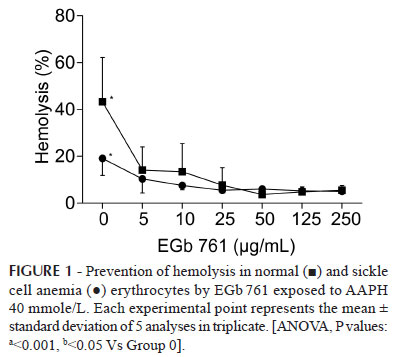Sickle cell disease promotes hemolytic anemia and occlusion of small blood vessels due to the presence of high concentrations of hemoglobin S, resulting in increased production of reactive oxygen species and decreased antioxidant defense capacity. The aim of this study was to evaluate the protective action of a standardized extract of Ginkgo biloba (EGb 761), selected due to its high content of flavonoids and terpenoids, in erythrocytes of patients with sickle cell anemia (HbSS, SS erythrocytes) subjected to oxidative stress using tert-butylhydroperoxide or 2,2-azobis-(amidinepropane)-dihydrochloride, in vitro. Hemolysis indexes, reduced glutathione, methemoglobin concentrations, lipid peroxidation, and intracellular reactive oxygen species were determined. SS erythrocytes displayed increased rates of oxidation of hemoglobin and membrane lipid peroxidation compared to normal erythrocytes (HbAA, AA erythrocytes), and the concentration of EGb 761 necessary to achieve the same antioxidant effect in SS erythrocytes was at least two times higher than in normal ones, inhibiting the formation of intracellular reactive oxygen species (IC50 of 13.6 µg/mL), partially preventing lipid peroxidation (IC50 of 242.5 µg/mL) and preventing hemolysis (IC50 of 10.5 µg/mL). Thus, EGb 761 has a beneficial effect on the oxidative status of SS erythrocytes. Moreover, EGb 761 failed to prevent oxidation of hemoglobin and reduced glutathione at the concentrations examined.
Ginkgo biloba; Oxidative stress; Erythrocytes; Azo compounds; Sickle cell anemia




